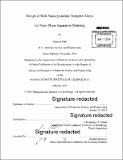Design of bulk nanocrystalline tungsten alloys via nano-phase separation sintering
Author(s)
Park, Mansoo, Ph. D. Massachusetts Institute of Technology
DownloadFull printable version (17.24Mb)
Other Contributors
Massachusetts Institute of Technology. Department of Materials Science and Engineering.
Advisor
Christopher A. Schuh.
Terms of use
Metadata
Show full item recordAbstract
An accelerated sintering method called 'nano-phase separation sintering' is developed, with specific applicability to nanostructured tungsten alloys. Nanocrystalline tungsten alloys containing minority additions of chromium are produced by high-energy ball milling and then consolidated. Such alloys exhibit the onset of sintering at a very low temperature around 950 °C and a very rapid rate of densification. The mechanism of this accelerated sintering is established through understanding the role of nano-scale, solid second phase precipitation during the sintering cycle, as analyzed by thermomechanical analysis, electron microscopy and x-ray diffraction. In addition, control experiments are used to establish that the accelerated sintering is apparently accomplished from the combination of two features of the powders: (i) nanocrystallinity and (ii) alloy supersaturation. In addition to accelerating sintering, the incorporation of alloying elements and second phases are also beneficial for mitigating grain growth during a thermal cycle, so nanophase separation sintering is thus naturally appropriate to the production of fine-grained bulk materials. Sintered compacts achieved through nano-phase separation sintering display 10~30 times smaller grain sizes at comparable densities than those produced by conventional accelerated sintering methods such as solid-state activated sintering and liquid phase sintering. The thermodynamic features and conditions for nano-phase separation sintering are further explored based on the binary phase diagram in order to generalize the concept to other alloy systems. After presenting a series of proposed alloy design rules, the consolidation of chromium with an addition of nickel is accelerated. Prospects of the technique for the development of full density bulk products in more complex alloy systems are also discussed.
Description
Thesis: Ph. D., Massachusetts Institute of Technology, Department of Materials Science and Engineering, 2015. Cataloged from PDF version of thesis. Includes bibliographical references (pages 96-100).
Date issued
2015Department
Massachusetts Institute of Technology. Department of Materials Science and EngineeringPublisher
Massachusetts Institute of Technology
Keywords
Materials Science and Engineering.